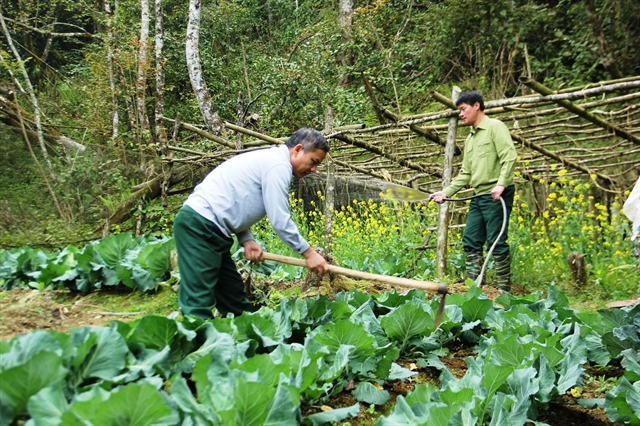 Society
Society


|
| In summer and spring, the climate is still as cold as the winter days in other areas and it's also the time soldiers of Buộc Mú station can grow vegetables and raise chickens. — Photo laodong.vn |
NGHỆ AN — While much of central Việt Nam is suffering from temperatures of more than 40 degrees Celsius, border guards at Puxailaileng Peak, the westernmost point of Nghệ An Province, face chilly cold and dense fog at an altitude of more than 2,700m.
Soldiers of Buộc Mú border guard station, at Na Ngoi border commune, Kỳ Sơn District, are tasked with protecting the border day-and-night.
To reach the centre of Na Ngoi Commune, you must travel on motorbikes on long roads with many wavy bends and slopes that hide the mountain top.
The change of climate, temperature and landscape strike one immediately, with the cold and white mists covering the precarious mountains bringing lonely and chilly feelings.
Arriving at the centre of Na Ngoi Commune, laodong.vn online newspaper reporters rested for 10 minutes before continuing the steep journey to Buộc Mú border guard station on motorbike.
Although it was the end of spring, the samu and pơ mu trees along both sides of the road were still bare and rough.
It took nearly an hour to reach the border guard station, although the route was only about 20km.
The border guard station was a house located in the middle of thousands of forest trees.
Lieutenant Colonel Nguyễn Trung Hoàn, deputy chief of Buộc Mú station, said Na Ngoi Commune is located in an important position, adjacent to Laos and protecting the border was an important task.
The middle-aged man with a tall body and tanned skin just like the samu trees at the top of the mountain, Hoàn warmly welcomed guests, explaining that in 2004, the provincial Border Guard Command decided to set up Buộc Mú station because of the importance of this region’s geographical location.
Here, six soldiers are regularly on duty day and night. In summer and spring, the climate is still as cold as winter elsewhere and it's also the time soldiers can grow vegetables and raise chickens. In other months of the year, the climate is too cold for vegetables and poultry to survive, so food has to be brought from elsewhere.
All food supplied to the station is cooked quickly and later reheated, as there are no storage facilities.
The lack of electricity also makes life difficult, as even in the middle of the day without a light, two people standing a few metres apart would struggle to see each other.
This makes batteries, candles and kerosene vital supplies, which sometimes can't be used for cooking.
“Eating under-cooked rice and drinking unboiled water is a regular occurrence,” Hoàn said.
The soldiers also face danger on patrol due to the rugged terrain and the thick fog.
“Everyone has to pack rice to eat, because on the high points on patrol, the air pressure increases and cooking rice and boiling water is difficult, he said.
The soldiers returned at 3pm after a patrol. They burned the wood stove from the dry samu branches, making the atmosphere less lonely.
Dinner was served. A small table filled with candlelight held a very simple meal with rice, forest vegetable soup, salty stewed fish and a can of meat.
“Lack of fresh food, lack of electricity and lack of phones all make people feel lonely in the wilderness of the cold climate,” a soldier said. “However, us, soldiers must also maintain our spiritual life with a guitar and jokes every night, which is enough for each person to have fun.”
Major Mai Việt Anh, deputy head of Na Ngoi Border Station, said: “Knowing the soldiers miss their families in Buộc Mú, we always try to send medical staff to the camp, and on weekends, create favourable conditions for them to drive motorbikes down to areas where telecommunication signal is available to call their families.”
“They always successfully complete their tasks, ensuring border security.” — VNS




